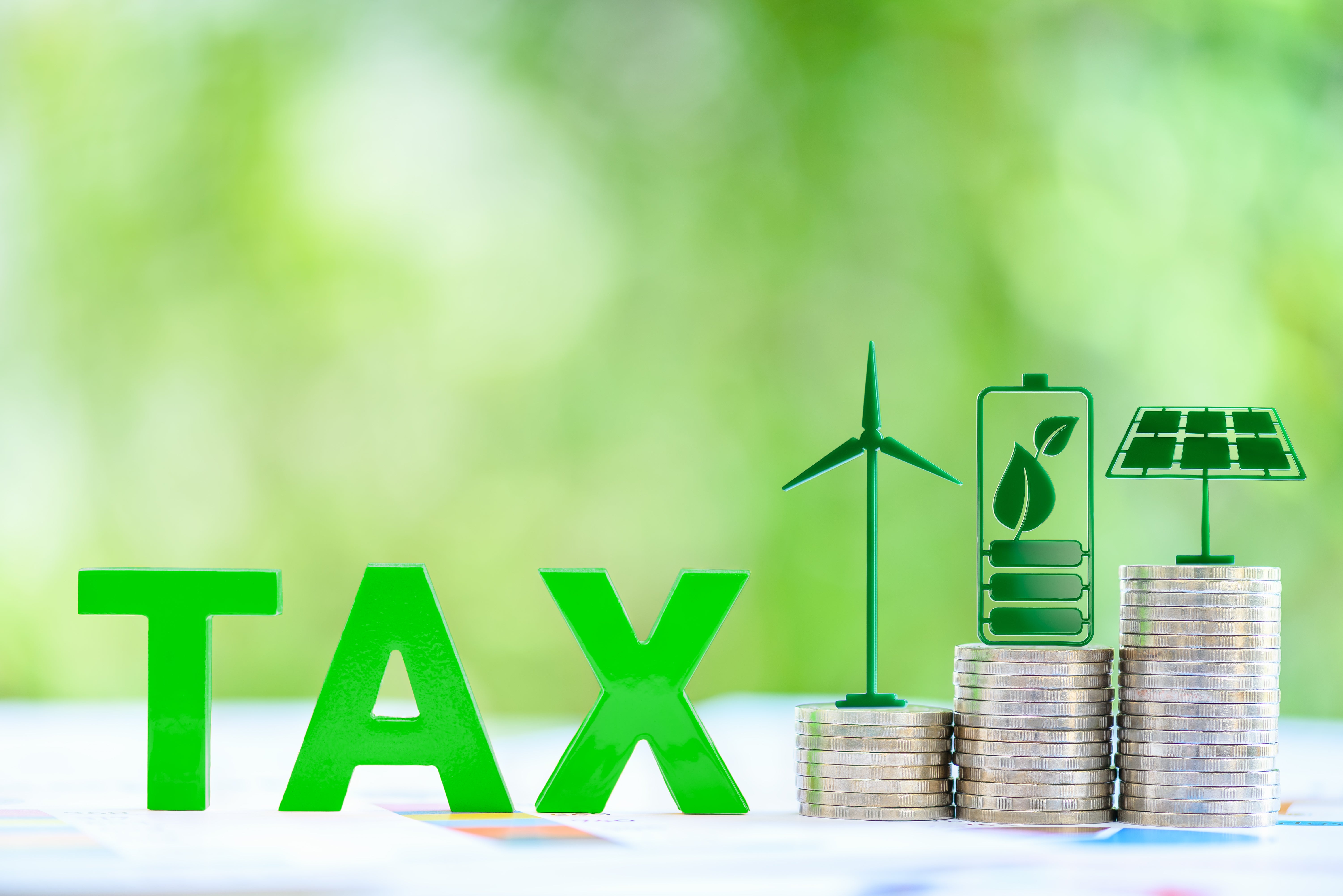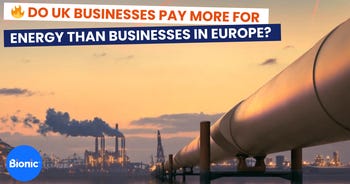What are green taxes? How UK energy policies impact business utility prices
Have you ever considered if your business is paying environmental taxes?
If there was ever a time to be conscious of extra costs, the time is now. The cost of living crisis is squeezing UK small business owners all over the nation, so any avenues that could potentially save costs in the long term are worth a thought.
To help, we’ve covered everything you need to know about ‘green taxes’ and UK Energy policies - from what they are and how they affect the business energy rates you’re paying. Keep on reading…

30-second summary
- Business energy rates can rise and drop at the drop of a hat, with many things causing this like supply issues, lack of storage, increased demand, bad weather, temperature changes and economic issues.
- Green taxes are taxes that are automatically applied to businesses to proactively encourage green business practices. This is to help reach Net Zero and reduce pollution.
- There are many renewable energy policies in place in the UK e.g. The Climate Change Levy, Plastic Packaging Tax and Landfill Tax - but not all businesses need to pay these taxes.
- These policies can have a positive effect on businesses by improving them to install green energy systems like solar panels or heat pumps. This, in turn, has business benefits like a better reputation with customers, fewer maintenance costs and a self-reliant energy source.
- If your business can't afford to install renewable energy systems, there are other green initiatives you can start to do like recycling waste or you can sign up for a green energy deal. Bionic can sort out a new energy deal for you.
What can affect the price of business energy prices?
The business energy market is anything but predictable, and different aspects influence the price of business energy - from environmental and economic factors to supply issues and increased demand.
We’ve broken down the main issues that small businesses should be aware of:
Low supply
When it comes to gas, in the UK, we simply don’t have enough. This is because of a mix of factors, but mostly because we don’t have enough room to store all the gas we need. This means we can only buy and replenish the gas we use at higher rates, not bulk buy it in advance at cheaper rates - as they do in France and The Netherlands, for example.
In 2021 we also had record-low gas shortages across the UK and Europe, which drove up wholesale gas prices. But at the start of 2023, the UK imported more LNG (liquid nitrogen gas) than in the last five years to make up for the shortage, but it’s still not enough to fill our reserves to the full.
And when supplies are scarce, it’s harder to buy and replenish stores; this creates a fight for resources and an increase in demand, driving up prices.
So why aren’t we using more renewables?
Building the infrastructure for renewable energy requires innovation and investment, especially for green gas, as it requires a lot of spare land, which is something that we, unfortunately, lack in the UK.
Although we know they will eventually run out, fossil fuels are still currently cheaper and easier to store than renewables because large amounts can be kept in tanks, pipelines or underground reserves. This leaves many suppliers still providing fossil-fueled energy.
But renewable energy is slowly getting cheaper. The private sector and government are investing in advances in technology, so renewable energy solutions should get cheaper in the near future.
Storage issues
In the UK, we use gas storage facilities such as depleted gas fields and salt caverns to keep our gas reserves when demand is low, this minimises short-term price fluctuations. These storage facilities are handy because we can access them in emergencies in case we suffer a major national shortage.
But we have a history of closing down storage facilities such as Rough —a natural gas storage facility under the North Sea — that stores up to 100 billion cubic feet of gas. This facility closed down in 2017 because of extensive repairs and no financial support.
But due to recent economic pressures affecting Europe’s gas supply, the Rough facility was recommissioned for 2022, improving the UK's gas supply by 50%. But this still significantly lags behind European stores like France and The Netherlands.
Increases in demand
Normally, when we experience prolonged winters, demand for gas goes up as homes and businesses need more to keep warm across the cold, dark months. And, like anything, if the demand increases, the price goes up to reflect it.
But 2022 was an exception. And it looks like it was largely due to the energy crisis and cost of living crisis. While it was one of the warmest summers on record, the winter was long, cold and snowy. This meant temperatures stayed freezing well into 2023. Usually, we would see more energy usage in these circumstances, but because of domestic and business energy price hikes, people and business owners have been more aware of cutting down energy usage to help their pockets.
At the start of 2023, industrial energy consumption was down 11%, so demand actually dropped. Maybe households and business owners have been more aware of cutting usage or were perhaps worried they'd not be able to afford higher bills.
Environmental factors
As a naturally windy territory, the UK has many wind farms that generate around 28% of our electricity supply. But we all know the British weather is unreliable - and on days where it isn’t windy, more gas is supplied to power stations to generate electricity to make up for the shortfall from wind turbines. This means you can end up paying more for electricity, even if it’s 100% renewable.
This is because energy prices are set using 'marginal cost pricing' - where the most expensive type of energy is used to set the price for all types of energy, including renewables. So if the price of gas rises and then gas-powered stations are used to top up a short supply of electricity, the extra costs will ultimately be reflected in the price of electricity.
Global weather conditions can also impact worldwide supplies of gas. This is because Europe borrows gas from the likes of Russia, China and other countries across the world. So natural disasters like hurricanes can wipe out supplies or disrupt supply chains, which creates a dent in supply. And anyone relying on these imports has to find gas elsewhere, driving up demand and increasing prices.
Read up on how the changing climate can affect small businesses.
Changes in temperature
Simply put, when it’s warmer, we use generally less energy. This goes for business owners heating up their offices and shop owners who turn up the thermostat and leave their lights on longer. Energy usage is likely to be less in the summer unless your business relies on heavy gas usage or has expensive cooling systems.
This means demand is lower, so the price of wholesale gas and electricity drops. As you may have guessed, when the temperature falls, demand goes back up - increasing prices again.
Read our full guide on the influences on UK gas prices.
Economical factors
Although the UK is not dependent on Russia for gas, many European countries are. In fact, only 4% of the UK’s gas supply comes from Russia. The UK generates almost half of its own gas and imports from countries like Norway to help spread the risk of supply issues.
However, countries like Germany import Russian gas. In 2021 we saw the operations on the Nord Stream 2 gas pipeline come to a halt, and this was set to supply a lot of gas to Germany. This had a knock-on effect, increasing demand for other sources of gas and pushing up prices elsewhere.
Are energy prices still rising? Find out in our handy guide on increasing UK energy prices.
What are ‘green taxes’?
Green taxes are basically environmental taxes or schemes applied to businesses to encourage more ‘green’ practices. These taxes incentive businesses to operate in a way that is less damaging to the environment reducing carbon footprint and waste. The UK government has different types of ‘green taxes’ depending on your business industry and size.
What renewable energy policies have been introduced?
There are several taxes the government has put in place to promote green trading in the UK:
- Climate Change Levy — A tax applied to encourage more energy-efficient business practices.
- Aggregates Levy — A tax applied on the exploitation of rock, sand and gravel to encourage recycling.
- Landfill Tax —A tax on top of a normal landfill fee if your business uses landfill sites to get rid of waste.
- EU Emissions Trading System (EU ETS) — A "cap and trade" scheme designed to reduce greenhouse gas emissions.
- Carbon Price Support — A business scheme you can apply for, designed to reduce emissions.
- Plastic Packaging Tax — A tax that is applied to businesses using plastic packaging with less than 30% recycled plastic
Read more detailed information on environmental tax measures.
Not all businesses need to pay these taxes, or if you do you may be able to get some relief against them in the following cases:
- Your business activities require high energy usage
- You’re a small business using minimal energy
- Your business uses energy-efficIent technology
See government information on renewable energy policies to see if you are exempt.
What is The Climate Change Levy?
One of the ‘green taxes’ that the government has in place for some businesses is The Climate Change Levy (CCL). This is a tax designed to encourage energy efficiency and reduce gas emissions to make businesses more environmentally responsible.
The CCL is made up of two rates:
- The main levy rate — This rate is applied if your business pays the standard 20% rate of VAT.
- Carbon Price Support rate — This is paid by owners of electricity generating stations and operators of combined heat and power (CHP) stations. If your business generates its own energy and you make money via the Feed-in Tariff or Smart Export Guarantee, then you probably won’t pay this.
Your business will most likely have to pay the CCL tax if you operate in the following industries:
- Industrial - e.g. machinery and tool manufacturers and also construction
- Commercial - e.g. retail, hospitality, warehouses and charities
- Agricultural - e.g. livestock and produce
- Public services - e.g. education, healthcare and security
The main rate is listed on your business energy bill, and you pay this rate on gas, electricity and any other solid fuels your business may use e.g. coal and petroleum coke.
If you don’t have this stated on your business energy bill, it’s likely your business doesn’t need to pay the CCL tax.
Why is the government implementing renewable energy policies?
The more renewable energy we use, the less reliant we are on fossil fuels. This means we will have fewer greenhouse gas emissions. This is great for the environment because:
- Reduced air pollution means fewer deaths
- Fewer greenhouse gasses slow down global temperature rises
- It promotes businesses to use eco-friendly practices
The government has a responsibility to help scale renewable energy incentives by providing policies, schemes and infrastructure to de-risk green energy investments and combat the challenges in the private sector.
We’re already on the right track - 58.5% of the electricity used in 2022 was generated from zero-carbon sources compared to 40% from gas and coal power stations. Over the next decade, it’s likely we will ramp up our renewable energy production to pave the way to a much greener nation.
How will these policies affect businesses?
At first glance, the UK energy policies may look like extra costs, but it’s best to look at it in the long run. They are in place to encourage businesses to benefit, especially if you invest in green practices.
Investing in green technology, especially for electricity production, may seem like the last thing on your mind as a business owner during the current economic climate. But, environmental sustainability is worth considering as ‘thinking green’ could give you the following benefits:
- Better public reputation — Being green is ‘good’, and your business will have a better public image if you use green practices. This is also something you can shout about and use as marketing material to stand out against competitors. However, you need to make sure that these are genuine green initiatives, as you could be criticised for ‘greenwashing’. Find out more with our guide.
- Fewer maintenance costs — Once installed, systems like solar panels and heat pumps are reliable and generally don’t require much maintenance.
- Stable energy costs — Business energy costs aren’t constant and can change at any time. Renewable energy sources aren’t affected by price rises.
- Energy independence — Renewable energy sources like solar panels and heat pumps allow you to generate your own power, meaning you rely less on providers for energy.
- You can sell excess energy — If you generate too much of your own electricity, you can actually sell it back to the grid through the Smart Export Guarantee (SEG).
Not all businesses will be able to rely on their own generated green energy to run day-to-day business activities, like restaurants and cafes that heavily use gas appliances. In this case, you could opt for a ‘green gas’ tariff. Bionic is partnered with one of the few green business gas suppliers, so you could compare and switch today.
Read more on renewable energy for small businesses.
What can businesses do to reduce the impact of ‘green taxes’ and renewable energy policies?
If you can, invest in generating your own green electricity, as you may qualify for some tax breaks and grants. But if your business is not in a situation where it’s feasible to install solar panels, heat pumps or other systems that generate your own energy, then switching to green business energy is another option - it’s much easier to do, and it shouldn’t cost you any more than your current tariff.
If you opt for a green energy deal, this means that your supplier uses up to 100% green energy produced from renewable sources. This applies to both electricity and gas, although ‘green gas’ is not yet widely supplied, and only a few suppliers offer business gas tariffs.
If you’ve still got a long way to go before rethinking a new business energy contract, then making small ‘greener’ business decisions might be the way to go.
For example, if you are a coffee shop and you currently pay landfill tax, you can investigate other sustainable ways to dispose of waste or leftover food.
You could sign up for initiatives that recycle food waste, like Business Waste or sell your leftover food on apps like Too Good To Go.
How can Bionic help?
At Bionic, we can advise on the best business energy deals based on your business circumstances. Our experts can talk you through the best green business energy deals including business gas and business electricity and compare live rates with you to help sort your next contract. Get in touch and speak to an expert today or read more with our helpful business energy guides.








